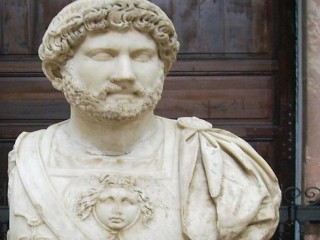
Hadrian biography
Date of birth : -
Date of death : -
Birthplace : Roman Empire
Nationality : Roman
Category : Historian personalities
Last modified : 2011-05-27
Credited as : Emperor of Rome, building Hadrian's Wall, palace at Tibur (modern Tivoli)
The Roman emperor Hadrian (76-138), or Publius Aelius Hadrianus, reversed the expansionist policies of Rome in a permanent shift to the defensive.
Hadrian was born in Rome on Jan. 24, 76. A ward of his uncle, Emperor Trajan, he spent the first 30 years of his life as a general and public official under Trajan's tutelage. There was a cloud over Hadrian's accession, for Trajan, though a relation, did not adopt him until on his deathbed, and there was some doubt even of that. The prompt execution of four possible rivals, though done without Hadrian's knowledge, also raised doubt.
At Hadrian's accession the Jewish revolt over much of the East and Trajan's faltering Parthian War were his first concerns. He ended the war by abandoning Armenia and Trajan's Parthian conquests, quelled the Jewish revolt, and returned to Rome (118). His administration was marked throughout by great care for finances—Trajan's wars had proved too costly—and strict governmental supervision of an increasing number of sectors of public and private life. Of great importance was his policy of appointing equestrians (knights), the class below the senators, instead of
freedmen to head the imperial bureaus. He thus recognized that these bureaus were organs of state, not household chores to be left to the Emperor's personal servants.
Hadrian's defensive policy posed problems of military discipline and morale, since it is always harder to maintain the efficiency of an army whose training may never be put to use. His answer was endless personal supervision, and he spent approximately half his reign touring the provinces on inspection. The system worked under Hadrian, but in time the efficiency of the armies declined.
Another result of Hadrian's defensive policy was the need for clearly marked frontiers and for border fortresses. He strengthened the defenses, notably in Germany and in Britain, where the most famous of all his frontier works, Hadrian's Wall, crosses Britain approximately along the border between England and Scotland.
Hadrian's last years were darkened by a new revolt of the Jews and the question of succession. He was responsible for the Jewish outbreak, since he decided to rebuild Jerusalem, in ruins since A.D. 70, as a Greek city with all Jews excluded save on one day a year. He also built a temple to Jupiter and the Emperor on the very site of the Jewish temple. This was too much to bear for the Jews of Judea, who had remained quiet during the previous revolt. They rose in 132, and the revolt lasted 3 1/2 years and cost the lives, it is said, of half a million people.
Hadrian became ill about 135, and the quest for a successor was acute. For unknown reasons he executed his nearest relation (136) and adopted Aelius Verus. Hadrian continued to linger, however, and Verus died. He then adopted Aurelius Antoninus, making him in turn adopt Verus's son Lucius Verus and Antoninus's own nephew, the future emperor Marcus Aurelius. Hadrian died unlamented on July 10, 138.
The most many-sided of the emperors, Hadrian was interested in all the arts. In literature his taste ran toward the archaic; in sculpture he preferred the classic. But his favorite discipline was architecture; he built the Pantheon and Castel Sant' Angelo, his own tomb, in Rome; added a whole new quarter to Athens; and made of his palace at Tibur (modern Tivoli) a museum of replicas of buildings he had seen on his travels.


















